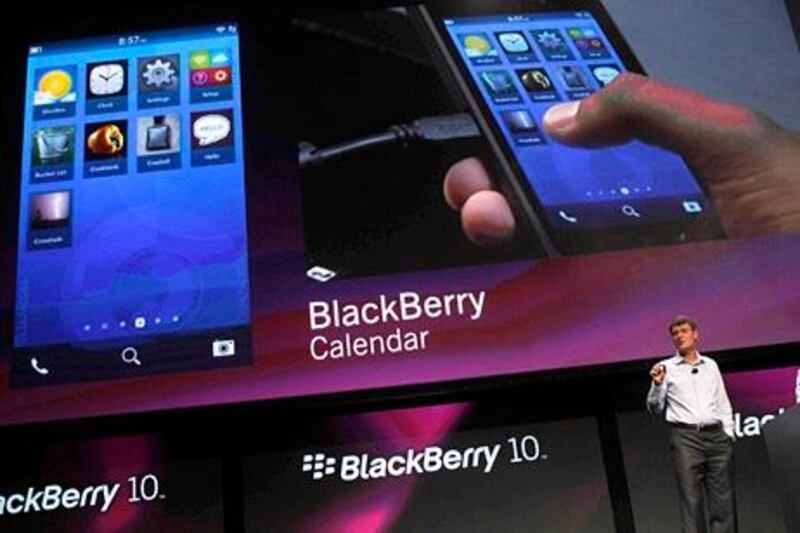The share price of Research in Motion (RIM) has boomed on high expectations for its long-awaited new BlackBerry 10 handsets.
But even though the company's stock doubled between late September and mid-December, some industry watchers are now predicting that the new range of Blackberry handsets may fail to have the impact RIM hopes.
The fear is that RIM, with its dwindling user base, has left it too late to catch up with Apple, maker of the iPhone, and Samsung, which is enjoying booming worldwide sales of its smartphones, powered by Google's Android software. Even the mobile phone dinosaur Nokia is being tipped for a comeback with its new range of phones running Microsoft's Windows software.
Ted Schadler, a US-based principal analyst at the international research firm Forrester, says: "RIM is facing a massive uphill climb to achieve even fourth place behind Apple, Android and Microsoft. They are yet another mobile platform at this point without the deep pockets needed to compete globally."
According to Nick Dillon, a senior analyst at the research company Ovum: "RIM's fortunes have declined significantly in the past two years ... The new operating system is likely to appeal largely to a dwindling base of existing BlackBerry users, and will provide only a brief respite in an overall downward trend."
RIM's fortunes hinge on the success of its newly upgraded software and handsets, which are due to be unveiled on January 30. Although RIM is keeping its new smartphones under wraps, it is expected that the handsets will have a similar, albeit enhanced, black businesslike design to previous models.
As the new BlackBerry smartphones will be using similar software to that of the "digital dashboard" systems found in most new US cars, RIM believes it will have particular appeal to business travellers. The smartphone maker is also hoping that the fact that its software is more secure than its rivals' will make the handsets more attractive in an era of growing industrial and political espionage.
RIM has a lot of lost ground to recapture. BlackBerry handsets were once a status symbol. Nicknamed the "CrackBerry" because of its supposed addictive qualities, the BlackBerry was the first handset to introduce truly efficient on-the-go email for business users. Until the end of 2010, the BlackBerry's popularity with businesses meant that almost every quarter brought growth in shipments and revenues.
But the last two years have seen significant declines as users have opted for sleeker, newer phones with thousands of new internet-based services and applications.
"It faces a significant uphill struggle, as several significant shifts in the market are working against it," adds Mr Dillon. "Firstly, businesses - once the primary buyers of devices for use in the business context - are giving way to individuals who make their own smartphone buying decisions and then bring those devices to work. Secondly, those individuals are making their buying decisions based on personal preferences."
RIM's problem is the way in which products such the iPhone have essentially rewritten the rules of the game. The BlackBerry's traditional strengths are productivity and enterprise support. But today, factors such as the attractiveness of the device, the content and the number of applications and third-party services it offers are considered more crucial than a secure email system or bespoke messaging service.
The BlackBerry 10 launch may give RIM breathing room if it can recapture some of its traditional business customer base. According to Ovum, there is still significant pent-up upgrade demand from the existing 80 million BlackBerry users, and the new devices should lead to a bounce in shipments, though not enormous growth.
There is, further, a growing view that business users might not be as entranced by the Apple iPhone 5 or Samsung Galaxy Note II as some industry watchers believe.
"I think there is a really good opportunity for RIM to come back," says Rob Enderle, an analyst in Silicon Valley. "None of the major platform players - Apple and Google - are really focusing on business needs at the moment."
There is little doubt that RIM still has a long battle to fight if it is to avoid joining the ranks of mobile phone makers such as Nortel, another once world-famous Canadian phonemaker that was eventually forced to file for bankruptcy.





